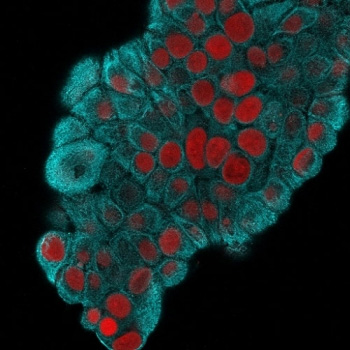- Tel: 858.663.9055
 Email: info@nsjbio.com
Email: info@nsjbio.com
- Tel: 858.663.9055
- Email: info@nsjbio.com
KRT19 Antibody detects keratin 19, a type I intermediate filament protein expressed in simple and non-keratinizing epithelia. Unlike many other keratins, KRT19 lacks a tail domain, giving it unique structural properties that influence filament assembly and epithelial resilience. It is widely expressed in glandular epithelia, bile ducts, the gastrointestinal tract, and specific epithelial tumors.
KRT19 is one of the most widely studied keratin markers in diagnostic pathology. It is used in panels to distinguish epithelial tumors and to identify circulating tumor cells (CTCs) in peripheral blood. Elevated KRT19 expression is associated with breast, lung, thyroid, and gastrointestinal cancers. Because of this, the KRT19 Antibody is essential for both basic epithelial biology and translational oncology.
Keratin 19 Antibody reagents are also used in regenerative medicine, developmental studies, and biomarker validation.
NSJ Bioreagents provides KRT19 Antibodies validated for immunohistochemistry, immunofluorescence, western blotting, ELISA, and flow cytometry. Each KRT19 Antibody undergoes rigorous validation to ensure specificity for keratin 19 while minimizing cross-reactivity with related keratins.
By choosing a KRT19 Antibody from NSJ Bioreagents, scientists gain reagents optimized for reproducibility. Our antibodies provide crisp staining in epithelial tissues, reliable detection in protein lysates, and consistent results across multiple platforms. With comprehensive datasheets, recommended controls, and detailed protocols, NSJ Bioreagents ensures that Keratin 19 Antibody products support both discovery science and clinical translation.
The KRT19 Antibody has wide-ranging applications across epithelial biology, cancer research, and translational medicine.
KRT19 Antibodies highlight non-keratinizing epithelia in glandular and mucosal tissues.
The KRT19 Antibody clarifies cytoskeletal organization and epithelial stability.
Keratin 19 Antibody reagents support developmental studies of epithelial differentiation.
KRT19 Antibodies are critical for distinguishing epithelial tumors in pathology panels.
The KRT19 Antibody is applied in breast, lung, and thyroid cancer diagnostics.
Keratin 19 Antibody reagents are used in colorectal cancer research for biomarker validation.
KRT19 Antibodies detect CTCs in blood, aiding cancer prognosis.
The KRT19 Antibody supports liquid biopsy research and monitoring of metastasis.
Keratin 19 Antibody tools are applied in clinical studies as prognostic markers.
KRT19 Antibodies help define epithelial lineage during embryogenesis.
The KRT19 Antibody supports studies of stem cell differentiation into epithelial lineages.
KRT19 Antibodies validate engineered tissues with correct epithelial identity.
The KRT19 Antibody ensures accurate epithelial differentiation in regenerative protocols.
KRT19 Antibodies are used in biomarker validation for targeted therapies.
The KRT19 Antibody supports precision oncology by linking expression to outcomes.
Keratin 19 Antibody reagents contribute to clinical trial monitoring and therapeutic evaluation.
Keratin 19 is a highly versatile epithelial marker with roles in both biology and medicine. The KRT19 Antibody provides researchers with precise detection of this keratin, while Keratin 19 Antibody reagents more broadly support oncology, pathology, regenerative medicine, and translational research.
In basic biology, KRT19 Antibodies highlight cytoskeletal function in epithelial tissues. In oncology, the KRT19 Antibody clarifies tumor origin and progression. In liquid biopsy, Keratin 19 Antibody products enable detection of CTCs, advancing non-invasive monitoring strategies.
Clinically, KRT19 is an established biomarker for cancer diagnostics and prognosis. By providing reliable detection, the KRT19 Antibody connects molecular discovery with patient outcomes, bridging basic research and clinical practice.
Keratin 19 is a distinctive epithelial marker with diagnostic and translational relevance. The KRT19 Antibody equips scientists and clinicians with a reliable tool for detecting keratin 19, while Keratin 19 Antibody reagents more broadly support cancer biology, epithelial research, and regenerative medicine. By linking fundamental biology with clinical applications, these antibodies remain indispensable for advancing medical science and improving patient care.

Immunofluorescent staining of MeOH fixed human MCF7 cells with KRT19 antibody (clone KRT19/800, blue) and Reddot nuclear stain (red).